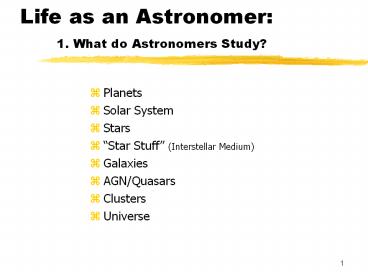Life%20as%20an%20Astronomer:%201.%20What%20do%20Astronomers%20Study? - PowerPoint PPT Presentation
Title:
Life%20as%20an%20Astronomer:%201.%20What%20do%20Astronomers%20Study?
Description:
Tell your horoscope. have a special line to space aliens. memorize the constellations ... download relevant journal articles to be read 'later' ... – PowerPoint PPT presentation
Number of Views:64
Avg rating:3.0/5.0
Title: Life%20as%20an%20Astronomer:%201.%20What%20do%20Astronomers%20Study?
1
Life as an Astronomer 1. What do Astronomers
Study?
- Planets
- Solar System
- Stars
- Star Stuff (Interstellar Medium)
- Galaxies
- AGN/Quasars
- Clusters
- Universe
2
Life as an Astronomer 1. What do Astronomers
Study?
- Solar System
- Sun
- Solar Wind
- Planets
- Moons
- Asteroids/NEOs
- Kuiper belt objects
- Interplanetary dust
- etc.
3
Life as an Astronomer 1. What do Astronomers
Study?
- Stars
- Variable stars
- Binary systems
- Dwarfs, Giants, etc
- Supernovae,
- Compact Objects (black holes, white dwarfs,
neutron stars)
4
Life as an Astronomer 1. What do Astronomers
Study?
- Star Stuff (Interstellar Medium)
- Star formation Protostars
- Chemistry
- Structure, Phase, and evolution
5
Life as an Astronomer 1. What do Astronomers
Study?
- Galaxies
- Formation Evolution
- Structure
- Populations
- Dynamics
- Environment (voids, field, groups, clusters)
6
Life as an Astronomer 1. What do Astronomers
Study?
- AGN (Active Galactic Nuclei) Quasars
- Formation
- Classification
- Fueling
- Evolution
- Number Density
7
Life as an Astronomer 1. What do Astronomers
Study?
- Clusters
- Formation Evolution
- Structure
- Dark Matter Content
- Lensing
8
Life as an Astronomer 1. What do Astronomers
Study?
- The Universe
- Age and Size
- Formation Evolution
- Content (dark matter, cosmic strings, exotic
particles) - Topology (shape)
9
Life as an Astronomer 2. How do we Work?
- Observations
- ground based (optical, near infrared, radio)
- Space based (rockets space platforms UV,
x-ray) - Computers
- analyze data
- solve complex problems
- numerical simulations
- Analysis
- objectivity
- read assimilate many forms of data
- linear non-linear thinking
- Writing
- research papers
- proposals
- presentations
10
Life as an Astronomer 3. Where do we Work?
- Academia
- Research University
- Teaching University/College
- Research Facilities
- Government Labs
- National Observatories
- Other
- planetariums, telescope support, etc.
- Private Sector
11
Life as an Astronomer 4. How do we spend our
time? (part 1 of 2)
- Academia Teaching University/College
- teach 3-4 classes/yr
- advise students
- run observatory labs
- support public outreach
- less emphasis on research
- Academia Research University
- bring in grant money
- publish research papers
- support observing facilities/instruments/
programs - supervise thesis projects
- teach 1-2 classes/yr
- serve on committees
12
Life as an Astronomer 4. How do we spend our
time? (part 2 of 2)
- Government Lab or National Observatory
- support user community
- publish research papers
- manage people/projects
- generally little or no teaching or grant raising
- Other/Private Industry
- planetariums
- science writing
- telescope operators
- science education
- computer programming/ systems support
- web design
- defense industry
- communications industry
- rocket scientist on Wall Street
13
Life as an Astronomer 5. Training
70 colleges/universities in U.S. offer Astronomy
or Astrophysics degree
B average or better and decent GRE scores
After M.S., attrition is mostly voluntary long
hours, but flexible schedule extensive
all-expense paid travel to exotic locations no
or poor health and retirement benefits
Support Teaching or Research Assistant 15,000
- 20,000/yr plus tuition waiver
14
Life as an Astronomer 5. Job Timeline
10 years from High School
Payscale 35,000-45,000 geographically limited
employment options no or poor benefits extensive
all-expense paid travel to exotic locations long
hours, but flexible schedule
16 years from High School
Payscale 45,000 - 70,000 at Assistant Rank
70,000 - 90,000 at Associate
Rank 90,000 - 170,000 at
Full Rank
geographically limited employment
options extensive travel long hours
22 years from High School before you know if you
have a permanent position
15
Life as an Astronomer 6. What Astronomers dont
do
- Tell your horoscope
- have a special line to space aliens
- memorize the constellations
- spend all their time looking through telescopes
16
Life as an Astronomer 6. A Typical Day
- Read dozens of e-mails
- attend some inane meeting
- teach a class or advise a student on a research
project - listen to or prepare a presentation on current
research - analyze some data or make a figure or plot
- download relevant journal articles to be read
later - work on a paper or a proposal for observing time
or research grant































